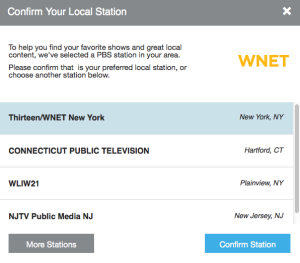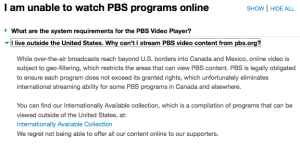
On Sunday and Monday 29-30 March there was a meeting of Wikipedians and representatives of members of the Corporation for Public Broadcasting. That organization is best known as the consortium supporting public broadcast media in the United States, including PBS, NPR, and all of the affiliates they have in every city in the United States. I went to the Sunday meeting at the WNET office. At the meeting, the story and conversation were familiar to me because I have heard this at Consumer Reports and many other organizations which were considering partnerships with Wikipedia. The story goes that the field of media professionalism is changing, and that it might be nice if the content produced by traditional media outlets could be disseminated with Wikipedia. Wikipedia has a popular Internet presence, but is lacking in quality content, and the traditional outlets have quality content, but need online presence. There would be benefit in the two collaborating to leverage each others’ strengths.
Other points that were raised were that Wikipedia and the CPB affiliates are all nonprofit. They introduced me to some interesting reports linking Wikipedia, Consumer Reports, and CPB affiliates as all being “public media”, and being natural partners. They talked about how CPB affiliates wanted to become closer to the demographic which prefers accessing media through Internet channels rather than through television or radio broadcast, and we talked about how the Wikimedia community wanted more access to the demographic which uses television and radio. We discussed the concept of complementary media and the “second screen”, which is an idea that someone might watch television or listen to radio with one telecommunications device, then on a second device seek more information perhaps on Wikipedia to give context to the other information they were simultaneously consuming. They talked about their archiving practices and how at any time they made much more of their older media available online than the typical commercial broadcaster – they said it was on the order of 15,000 programs in their nonprofit space versus 500 programs in the largest commercial space – but that surfacing this content was difficult, and perhaps Wikipedia could direct people who search for this content to their archives. All of these things sound like good points for discussion. The Wikimedia community has believed all of this since inception. In my opinion, nothing was new about these ideas, because Wikipedians have always said these things anyway, but it was unusual that the CPB affiliates gave some attention to these ideas, because most other organizations avoid Wikipedia. Their change in perspective is probably due to their increasing risks in losing market share with time, trouble with their fundraising strategy as local fundraising models for media become less effective as all local broadcasters begin to compete internationally, their aging audience and the break of a generation between their youngest fans and Wikipedia’s most supportive fanbase, and Wikipedia’s growing esteem and solidly established position as the most popular nonprofit website in the world. I am sure they have other reasons which are less pressing – there are a large number of reasons why partnerships with Wikipedia are cost effective for large organizations with a lot of information to share.

It struck me as odd that one of the CPB executives said that PBS and NPR used to have high Internet ranking through Alexa Internet, and that recently Wikipedia surpassed their popularity. As a Wikipedian, I was not entering this meeting with an expectation that such a thing could be true, but I think it was not a joke and that there really might have been some belief in the industry that the Internet presence of some of the CPB affiliates might have been comparable to that of the Wikimedia projects. I thought about the context in which that could have been true, and the more I thought about it the more I thought about asking more. I still have not asked and I wonder a lot, because it would be fascinating if there were a context in which that were so but of which I were ignorant, and just as fascinating if that cannot be remotely true but somehow it were a representative belief in the media industry, or even beyond into many industries. I wonder if many organizations with relatively small amounts of Internet traffic are satisfied with what they already have, and if so, how that might preclude them from considering ways to become more noticed. Wikipedia has been in the top 10 most popular websites since 2007, so already the online relevance rankings were established some years ago. I was surprised that anyone could think that NPR or PBS were ever contenders as well-known websites. I just checked their global ranking on Alexa – PBS is #981 and NPR is 451, which are both impressive numbers and indicative of a sizable audience, but still not what I would call popular for Internet media. Looking only at the United States they have higher rank, and their funding base is in the United States, but I am not sure whether the US ranking is most relevant either now or in the future. My expectation was that PBS never sought Internet popularity, and I thought that for a range of reasons. One is that I know that on their website to watch a television show one has to navigate a series of choices to indicate where one is geographically and make some commitment to connect with a local brick-and-mortar television station. The idea of serving unlimited Internet resources only to people of a certain geography seems antithetical to the concept of the Internet to me. I wonder how it happens or what long term plans of the manager are when Internet resources are restricted to people based on their geographical location, because the idea of restricting access to content based on geography is antithetical to the concept of Internet. I think all websites for television shows do this, and it remains weird. An organization which has made a commitment to restricting access based on the geography of their audience can never hope to have a strong global Internet ranking by popularity, because the Internet is global and comparing the popularity of a global website to a “local website” hardly makes sense. I know that television stations have copyright problems, and I know these problems seem intractable. Sometimes I wonder if the business plan of some of these organizations is that executive staff will skate through 15 years to retirement then leave the tough questions for the next generation, and let the consequences come as they may. Sometimes I feel that at meetings like this one, so many good ideas come to the table but somehow a group of very talented people who all see the way forward can be constrained by their organizational infrastructure and by some amorphous authorities somewhere out of sight but nearby, and that decisions are made based on something other than the choices and opinions of the stakeholders and project leaders. I have a lot of sympathy for CPB, but is there really any thought in the organization that they at some time have had a significant global Internet presence? Does it even make sense that they would talk of global broadcast strategy and compare themselves to Wikipedia? Is it thinkable that in the future that someday, web content will be as restricted geographically as it is now, and is it someone’s fantasy that web content become even more geographically restricted in the future?
This meeting’s importance was comparable to that of many other meetings between the Wikimedia community and organizations in New York City. An unusual aspect of this meeting was that Wikimedia Foundation communication officer Katherine Maher had negotiated it and convened it, and three people from the communications consulting company Minassian Media also were present. About ten people from CPB were there, then on Sunday about six Wikipedians where there. It would be a post for another time, but among the Wikipedians, it was noticed that individuals in the Wikimedia community are treated as equals at the table, and are the last word in making decisions in partnerships, yet everyone else is paid at New York City communications professional rates, and Wikipedians tend to make money at entry-level rates mostly due to their preoccupation with Wikimedia community organizing. I feel fortunate that I have a job with Consumer Reports and can join these things, but also I have mixed feelings at how the Wikimedia movement is built on a volunteer structure and remains dependent on it. The end result is that community volunteering, personal relationships with people who need a Wikipedia connection for their careers (like WMF staff and Wikimedia partners in outreach), obligations to friends in the Wikimedia community, and a responsibility to look after one’s own career often are blurred. If the average pay among paid staff at the table was 80k/year or 45/hour, then 3 hour meetings like this one are a bigger financial investment than most Wikimedia community groups fundraise or spend in a year. I sometimes worry that the Wikimedia community is so vulnerable, and that the infrastructure that is developed is not growing the community base of volunteers who are called to make judgements at these meetings nor supporting them to be removed from bias and influence that comes from being placed at a table with people who have career interests at stake. The Wikimedia community has the best systems I have seen anywhere for supporting volunteers and I will not say that anyone else could do better to support a volunteer community base, but sometimes I wonder if any support could be developed to empower the community base more.